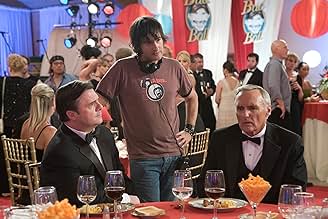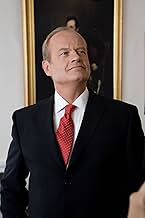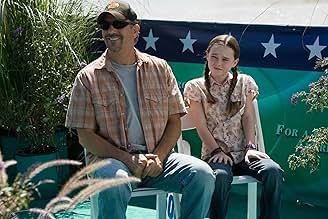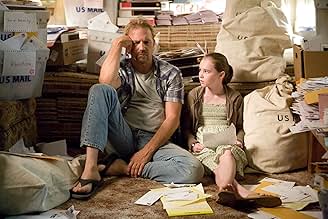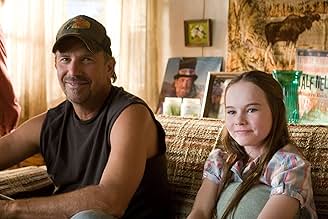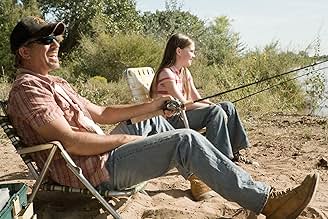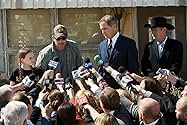AVALIAÇÃO DA IMDb
6,1/10
20 mil
SUA AVALIAÇÃO
Adicionar um enredo no seu idiomaIn a remarkable turn-of-events, the result of the presidential election comes down to one man's vote.In a remarkable turn-of-events, the result of the presidential election comes down to one man's vote.In a remarkable turn-of-events, the result of the presidential election comes down to one man's vote.
- Direção
- Roteiristas
- Artistas
- Prêmios
- 1 indicação no total
Charles Esten
- Lewis
- (as Charles 'Chip' Esten)
- Direção
- Roteiristas
- Elenco e equipe completos
- Produção, bilheteria e muito mais no IMDbPro
Avaliações em destaque
Kevin Costner was actually in another decent movie. His last movie I saw, Mr. Brooks, was pretty good also. I would call this movie a political satire, that tries to be a little funny at times. However, the idea that one guy determines the presidential election is absurd, but if you can get past that, then the plot is OK. It was funny how the movie had the political parties doing adds for things they oppose. Example, the democrats supporting pro life because Bud says he's pro life.
The plot is struggling, every day man, Bud Johnson, just got laid off. He has a very smart daughter and she cares about the presidential election. Bud promises to vote since Molly thinks it's important. But, when he doesn't show, Molly votes in his place but the power goes out and the vote didn't count. The election comes down to New Mexico and for some reason, not told in the movie, Bud's vote will decide the electoral votes. I mean, how could the votes be even for each side and even if they were very close, how many months would it take for all the recounts that would take place. But any way, it's up to Bud, whom doesn't care about politics. He becomes an instant celebrity and is courted by both candidates. By the end of the film, Bud grows an appreciation for the political scene and realizes that it is important to care about social issues.
FINAL VERDICT: Funnier than I thought and provides a message. Plus, the movie doesn't try to say that one party is better than the other.
The plot is struggling, every day man, Bud Johnson, just got laid off. He has a very smart daughter and she cares about the presidential election. Bud promises to vote since Molly thinks it's important. But, when he doesn't show, Molly votes in his place but the power goes out and the vote didn't count. The election comes down to New Mexico and for some reason, not told in the movie, Bud's vote will decide the electoral votes. I mean, how could the votes be even for each side and even if they were very close, how many months would it take for all the recounts that would take place. But any way, it's up to Bud, whom doesn't care about politics. He becomes an instant celebrity and is courted by both candidates. By the end of the film, Bud grows an appreciation for the political scene and realizes that it is important to care about social issues.
FINAL VERDICT: Funnier than I thought and provides a message. Plus, the movie doesn't try to say that one party is better than the other.
It sounds implausible and impossiblethat a man's accidental flub-up in the voting booth causes his vote to stall the election and coincidentally determine the next U.S. President. But Swing Vote has a great time using that as a platform to tell a really cool tale.
Besides, the movie wants to move past that impossibility anyway (suspension of disbelief, right?), and into the fun stuff. Swing Vote isn't necessarily about the likelihood of the above-mentioned phenomenon occurring; it's about bigger things, things like the nature of freedom in America, the right to vote, politicians and their campaigns, and various issues that unite and divide America as a nation.
Ernest "Bud" Johnson (Kevin Costner) is a beer-drinking, blue-collar simpleton whose wife left both him and his daughter, Molly, for a Nashville singing career. Molly (Madeline Carroll), a precocious little girl who is passionate about politics and the preservation of her country, and unfortunately for her, Bud couldn't care less, even if her were sober. Molly seems to be the parent in the relationship, taking care of Bud's daily hangovers and prodding him to get up for work.
Molly is in constant frustration with her father's apathy toward life and her interests, and is perturbed when Bud seemingly sets in motion an ironic, history-making turn of events where his vote actually ends up being the deciding factor in the election. This forces the Presidential candidates to campaign only to win Bud's vote. Along the way we are treated to a satirical look at the lengths campaign managers and the candidates will go simply to get a vote.
How this plays out is both hilarious and sobering, as well as inspiring and totally enjoyablethanks to some good storytelling and direction, as well as an excellent cast of talented actors who make this movie shine. The brightest stars on the screen, however, are Kevin Costner and Madeline Carroll as Bud and Molly. Costner has found a perfect role in the dimwitted Bud, and Carroll as Molly is a brilliant young actor whose performance almost brought me to tears at one point.
Like I mentioned before, though, Swing Vote is not a simple "voting is your civic duty" story. While the importance of voting is emphasized as both a privilege and a blessing in a great country, Swing Vote goes over the issues that affect daily life in America, and through the story reminds us how we can take some sort of action to better that life.
However, Swing Vote is careful not to play too much on the emotional arguments regarding various issues like abortion, immigration and gay marriage, making the movie all the more charming. There are a few emotionally charged scenes in the movie that give weight to the hilarity throughout, but within the context of the film, the story never speaks in self-righteousness.
At one point, Molly makes a simple yet convicting commentary about how much she appreciates her father at a "Bring Your Father to School" Day. Without giving too much away, Molly's emotional message about her father is a hopeful and heart-wrenching commentary about the beauty and freedom of America, along with the tragic complacency and apathy of its people.
And rather than going down the typical Hollywood route and picking a more liberal stance, Swing Vote instead manages to poke fun at everyone on both "sides" of various issues. It carefully gives respect to all Americans, while pointing out absurdities in America's political process. Although the mockery is at times absolutely hilarious, the film's humor never ventures into the vile and mean-spirited. There is purpose behind all the fun, and it is carefully crafted into the story, with the goal of giving a message of hope and focusing on the (hopefully) common goal of compassion, care, peace, and freedom to all people (to all Americans, anyway).
In that sense, Swing Vote could almost be seen as patriotic (even the movie's production design seems to have red, white, and blue hues throughout). There are many inspiring moments that make you think, "Wow, America is a great country," and "Shame on me for taking my freedom for granted." Okay, well, that's a little simplistic; but you'll understand what I mean: Swing Vote is an American story with a clear and powerful message.
It may be convicting in its truthful satire and simple wit, but it is also encouraging in that it promotes the hope that we can make a better country by actively changing (ourselves and our country) and refusing to passively observe our nation's future unfold... not only for us, but for generations to come.
Besides, the movie wants to move past that impossibility anyway (suspension of disbelief, right?), and into the fun stuff. Swing Vote isn't necessarily about the likelihood of the above-mentioned phenomenon occurring; it's about bigger things, things like the nature of freedom in America, the right to vote, politicians and their campaigns, and various issues that unite and divide America as a nation.
Ernest "Bud" Johnson (Kevin Costner) is a beer-drinking, blue-collar simpleton whose wife left both him and his daughter, Molly, for a Nashville singing career. Molly (Madeline Carroll), a precocious little girl who is passionate about politics and the preservation of her country, and unfortunately for her, Bud couldn't care less, even if her were sober. Molly seems to be the parent in the relationship, taking care of Bud's daily hangovers and prodding him to get up for work.
Molly is in constant frustration with her father's apathy toward life and her interests, and is perturbed when Bud seemingly sets in motion an ironic, history-making turn of events where his vote actually ends up being the deciding factor in the election. This forces the Presidential candidates to campaign only to win Bud's vote. Along the way we are treated to a satirical look at the lengths campaign managers and the candidates will go simply to get a vote.
How this plays out is both hilarious and sobering, as well as inspiring and totally enjoyablethanks to some good storytelling and direction, as well as an excellent cast of talented actors who make this movie shine. The brightest stars on the screen, however, are Kevin Costner and Madeline Carroll as Bud and Molly. Costner has found a perfect role in the dimwitted Bud, and Carroll as Molly is a brilliant young actor whose performance almost brought me to tears at one point.
Like I mentioned before, though, Swing Vote is not a simple "voting is your civic duty" story. While the importance of voting is emphasized as both a privilege and a blessing in a great country, Swing Vote goes over the issues that affect daily life in America, and through the story reminds us how we can take some sort of action to better that life.
However, Swing Vote is careful not to play too much on the emotional arguments regarding various issues like abortion, immigration and gay marriage, making the movie all the more charming. There are a few emotionally charged scenes in the movie that give weight to the hilarity throughout, but within the context of the film, the story never speaks in self-righteousness.
At one point, Molly makes a simple yet convicting commentary about how much she appreciates her father at a "Bring Your Father to School" Day. Without giving too much away, Molly's emotional message about her father is a hopeful and heart-wrenching commentary about the beauty and freedom of America, along with the tragic complacency and apathy of its people.
And rather than going down the typical Hollywood route and picking a more liberal stance, Swing Vote instead manages to poke fun at everyone on both "sides" of various issues. It carefully gives respect to all Americans, while pointing out absurdities in America's political process. Although the mockery is at times absolutely hilarious, the film's humor never ventures into the vile and mean-spirited. There is purpose behind all the fun, and it is carefully crafted into the story, with the goal of giving a message of hope and focusing on the (hopefully) common goal of compassion, care, peace, and freedom to all people (to all Americans, anyway).
In that sense, Swing Vote could almost be seen as patriotic (even the movie's production design seems to have red, white, and blue hues throughout). There are many inspiring moments that make you think, "Wow, America is a great country," and "Shame on me for taking my freedom for granted." Okay, well, that's a little simplistic; but you'll understand what I mean: Swing Vote is an American story with a clear and powerful message.
It may be convicting in its truthful satire and simple wit, but it is also encouraging in that it promotes the hope that we can make a better country by actively changing (ourselves and our country) and refusing to passively observe our nation's future unfold... not only for us, but for generations to come.
My son tells me that I don't understand what young people think is funny. And he's right. I'm not into cringe comedies like Borat or teen sex comedies like Superbad. So when I give Swing Vote 9 out of 10, I guess I have to limit my recommendation to those over 50. If you're too young to remember Kevin Costner's last great movie, I'm not so sure you'll like this one. You see, no one gets humiliated and you don't hear any jokes about sex or bodily functions. It's an old-fashioned comedy that my wife, my cousin and I, all near 60, loved. If you are in that age range, ignore the critics and the IMDb rating. We laughed all the way through. The editing is fast paced so that you never get bored. Some critics have criticized Swing Vote for being lightweight, but it is really more dramedy than straight comedy. There are several serious themes including divorce and civic responsibility. This is Costner's best performance in many years. And Madeline Carroll, who plays his daughter, is amazing. Watch out, Dakota Fanning and Abigail Breslin. This girl can play comedy and drama with equal aplomb. The scene where she cries in front of her class brought many to tears in our audience.
"Swing Vote" is a good movie. It could have been great, but it isn't, but it is still good. At its best, it invokes Frank Capra's classic films on politics, including "Meet John Doe" and "Mr. Smith Goes to Washington." It never reaches their level, though, and that failure to hit the top is a bit frustrating.
An older, dumpier, and shabbier Kevin Costner is the best part of the film. Costner is a star and that shows here. Even the grunge that is his costume in almost every scene can't disguise his charisma. Costner's voice has not aged and he uses it to great effect, especially in a final speech.
The film draws laughs by parodying our two major political parties, with a Democratic presidential candidate starring in the funniest anti-abortion TV commercial ever made (no doubt its competition was slim, but it is very funny) and a Republican presidential candidate touting his party's tender concern for the environment.
These excellent scenes make you wish that the movie had gone deeper. It doesn't, though. It veers off into dead-end soap opera subplots about Costner's daughter's boyfriend from school and her attempt to live with her estranged mother (Mare Winningham, in a role that should have ended up on the editing room floor, as it contributes nothing to the film.) The casting wasn't great. The two presidential candidates and their aids end up being cardboard cut-out stereotypes of Machiavellian evil (Stanley Tucci) and compromise (Nathan Lane). Kelsey Grammar and Dennis Hopper, as the candidates, never transcend their "Frasier" and "Easy Rider" personas. Other actors, perhaps unknowns, should have been cast in these two key roles.
Paula Patton, the woman who played what would have been the Barbara Stanwyck role in the Frank Capra movie, was pretty as a little doll and a complete bore. This is part of a pattern in today's Hollywood; female leads must have the perfectly perky looks of a plastic doll; there's no need for them to be talented. Male leads, like Costner, can be beat-up, and slovenly, but must be talented. Patton's role, that of the desperate, sharp, female reporter who gains inside knowledge of a national story, is underwritten, and she does nothing with it. It's a dead-end, and that's a shame. It makes me want to rewatch "Meet John Doe" in which Stanwyck worked so well as the female reporter.
Overall, though, this movie is better than much else at the multiplex, and it at least ventures into the world of ideas.
An older, dumpier, and shabbier Kevin Costner is the best part of the film. Costner is a star and that shows here. Even the grunge that is his costume in almost every scene can't disguise his charisma. Costner's voice has not aged and he uses it to great effect, especially in a final speech.
The film draws laughs by parodying our two major political parties, with a Democratic presidential candidate starring in the funniest anti-abortion TV commercial ever made (no doubt its competition was slim, but it is very funny) and a Republican presidential candidate touting his party's tender concern for the environment.
These excellent scenes make you wish that the movie had gone deeper. It doesn't, though. It veers off into dead-end soap opera subplots about Costner's daughter's boyfriend from school and her attempt to live with her estranged mother (Mare Winningham, in a role that should have ended up on the editing room floor, as it contributes nothing to the film.) The casting wasn't great. The two presidential candidates and their aids end up being cardboard cut-out stereotypes of Machiavellian evil (Stanley Tucci) and compromise (Nathan Lane). Kelsey Grammar and Dennis Hopper, as the candidates, never transcend their "Frasier" and "Easy Rider" personas. Other actors, perhaps unknowns, should have been cast in these two key roles.
Paula Patton, the woman who played what would have been the Barbara Stanwyck role in the Frank Capra movie, was pretty as a little doll and a complete bore. This is part of a pattern in today's Hollywood; female leads must have the perfectly perky looks of a plastic doll; there's no need for them to be talented. Male leads, like Costner, can be beat-up, and slovenly, but must be talented. Patton's role, that of the desperate, sharp, female reporter who gains inside knowledge of a national story, is underwritten, and she does nothing with it. It's a dead-end, and that's a shame. It makes me want to rewatch "Meet John Doe" in which Stanwyck worked so well as the female reporter.
Overall, though, this movie is better than much else at the multiplex, and it at least ventures into the world of ideas.
If the 2000 Presidential election could be decided by a single county in Florida (with a little help from the United States Supreme Court, of course), imagine what it would be like if the decision ever came down to a single individual voter! That's the scenario put forth by "Swing Vote," a political fantasy that will probably be remembered more for launching the career of a talented young actress than for any insight it might offer into the political process.
Bud Johnson is a working-class divorced dad who lives in a broken-down trailer with his bright, twelve-year-old daughter, Molly - a youngster who is as astute and savvy about real world issues and politics as her father is ignorant and apathetic. Through a complicated fluke of fate, Bud finds himself in the unenviable position of being the sole swing vote in an otherwise deadlocked presidential contest. Suddenly, Bud is living in the glare of the media spotlight, besieged by candidates, campaign managers, handlers, celebrities and various special interest groups all vying for his vote.
Political satire rarely works on screen for the simple reason that it is either so slanted (usually towards the liberal side) that it winds up preaching mainly to the converted, or it's kept so inoffensive and generic that it loses any edge it might have had and becomes an exercise in watered-down, self-congratulatory Capraesque populism. "Swing Vote," oddly enough, falls into both categories at once - with conservatives likely to view it as little more than a two-hour commercial for the Democratic Party (or at least the issues they stand for) and move on. In strictly cinematic terms, "Swing Vote," co-written by Jason Richman and Joshua Michael Stern and directed by Stern, is really two movies folded into one. The first is a sometimes touching story of a father/daughter relationship in which the child is parent to the father. Kevin Costner (who pretty much financed the project himself) pours on the charm as a boozy, irresponsible slacker who's more interested in popping open a beer can and plopping down in front of the TV set than in actively rearing his daughter. Relative newcomer Madeline Carroll is a real find as the no-nonsense, wise-beyond-her-years Molly who takes care of her dad and isn't afraid to speak truth to power when the situation calls for it. Whenever the film is concentrating on the interplay between these two characters, it hits a responsive chord in the viewer. In fact, the scene in which Molly confronts the alcoholic mother who abandoned her (wonderfully played by Mare Winningham) makes for some genuinely powerful and gripping human drama.
Unfortunately, the second and much larger portion of the film (that is to say, the political part) doesn't fare nearly so well. Its revelation that politics is a dirty business - i.e. that it often prizes empty platitudes and sound bites over exploring issues of substance, and that it appeals to voters' greed, fears, ignorance and prejudices to win votes - is hardly an earth-shattering one at this late stage of the game, true though it may be. The film has lots of big-name stars - Kelsey Grammar, Dennis Harper, Nathan Lane, Stanley Tucci, George Lopez, Judge Reinhold - and a number of actual TV pundits and commentators throwing themselves into their roles with admirable aplomb, but the material isn't clever or sharp enough to really deliver the goods. Everyone, except for the two main characters, is quickly reduced to a "type" and the attempts at political parody are fairly obvious and lightweight compared to what we find in venues like "The Daily Show" or "The Colbert Report."
"Swing Vote"'s clarion call for all individuals to take their responsibility as citizens seriously and to become actively involved in the political process can't help but be uplifting and inspiring, especially in a presidential election year. The filmmakers just needed a bolder, more sophisticated vehicle from which to sound that call.
My advice is to look past all the political nonsense and concentrate on the beautiful performance by the young Ms. Carroll instead - and be present at the birth of a brand new star.
Bud Johnson is a working-class divorced dad who lives in a broken-down trailer with his bright, twelve-year-old daughter, Molly - a youngster who is as astute and savvy about real world issues and politics as her father is ignorant and apathetic. Through a complicated fluke of fate, Bud finds himself in the unenviable position of being the sole swing vote in an otherwise deadlocked presidential contest. Suddenly, Bud is living in the glare of the media spotlight, besieged by candidates, campaign managers, handlers, celebrities and various special interest groups all vying for his vote.
Political satire rarely works on screen for the simple reason that it is either so slanted (usually towards the liberal side) that it winds up preaching mainly to the converted, or it's kept so inoffensive and generic that it loses any edge it might have had and becomes an exercise in watered-down, self-congratulatory Capraesque populism. "Swing Vote," oddly enough, falls into both categories at once - with conservatives likely to view it as little more than a two-hour commercial for the Democratic Party (or at least the issues they stand for) and move on. In strictly cinematic terms, "Swing Vote," co-written by Jason Richman and Joshua Michael Stern and directed by Stern, is really two movies folded into one. The first is a sometimes touching story of a father/daughter relationship in which the child is parent to the father. Kevin Costner (who pretty much financed the project himself) pours on the charm as a boozy, irresponsible slacker who's more interested in popping open a beer can and plopping down in front of the TV set than in actively rearing his daughter. Relative newcomer Madeline Carroll is a real find as the no-nonsense, wise-beyond-her-years Molly who takes care of her dad and isn't afraid to speak truth to power when the situation calls for it. Whenever the film is concentrating on the interplay between these two characters, it hits a responsive chord in the viewer. In fact, the scene in which Molly confronts the alcoholic mother who abandoned her (wonderfully played by Mare Winningham) makes for some genuinely powerful and gripping human drama.
Unfortunately, the second and much larger portion of the film (that is to say, the political part) doesn't fare nearly so well. Its revelation that politics is a dirty business - i.e. that it often prizes empty platitudes and sound bites over exploring issues of substance, and that it appeals to voters' greed, fears, ignorance and prejudices to win votes - is hardly an earth-shattering one at this late stage of the game, true though it may be. The film has lots of big-name stars - Kelsey Grammar, Dennis Harper, Nathan Lane, Stanley Tucci, George Lopez, Judge Reinhold - and a number of actual TV pundits and commentators throwing themselves into their roles with admirable aplomb, but the material isn't clever or sharp enough to really deliver the goods. Everyone, except for the two main characters, is quickly reduced to a "type" and the attempts at political parody are fairly obvious and lightweight compared to what we find in venues like "The Daily Show" or "The Colbert Report."
"Swing Vote"'s clarion call for all individuals to take their responsibility as citizens seriously and to become actively involved in the political process can't help but be uplifting and inspiring, especially in a presidential election year. The filmmakers just needed a bolder, more sophisticated vehicle from which to sound that call.
My advice is to look past all the political nonsense and concentrate on the beautiful performance by the young Ms. Carroll instead - and be present at the birth of a brand new star.
Você sabia?
- CuriosidadesStanley Tucci's line "If you'd ever met my mother, you'd understand," was an ad-lib.
- Erros de gravaçãoAir Force One is never allowed to sit idle on a runway with the President on board.
- Citações
Molly Johnson: I want to live with Mom.
Bud Johnson: So do I.
- Cenas durante ou pós-créditos"and introducing Madeline Carroll"
- Trilhas sonorasCan't You See
Written by Toy Caldwell Jr. (as Toy Caldwell)
Performed by The Marshall Tucker Band
Courtesy of Shout Factory, LLC
By Arrangement with Natural Energy Lab
Principais escolhas
Faça login para avaliar e ver a lista de recomendações personalizadas
Detalhes
Bilheteria
- Orçamento
- US$ 21.000.000 (estimativa)
- Faturamento bruto nos EUA e Canadá
- US$ 16.289.867
- Fim de semana de estreia nos EUA e Canadá
- US$ 6.230.669
- 3 de ago. de 2008
- Faturamento bruto mundial
- US$ 17.635.397
- Tempo de duração
- 2 h(120 min)
- Cor
- Mixagem de som
- Proporção
- 2.35 : 1
Contribua para esta página
Sugerir uma alteração ou adicionar conteúdo ausente







